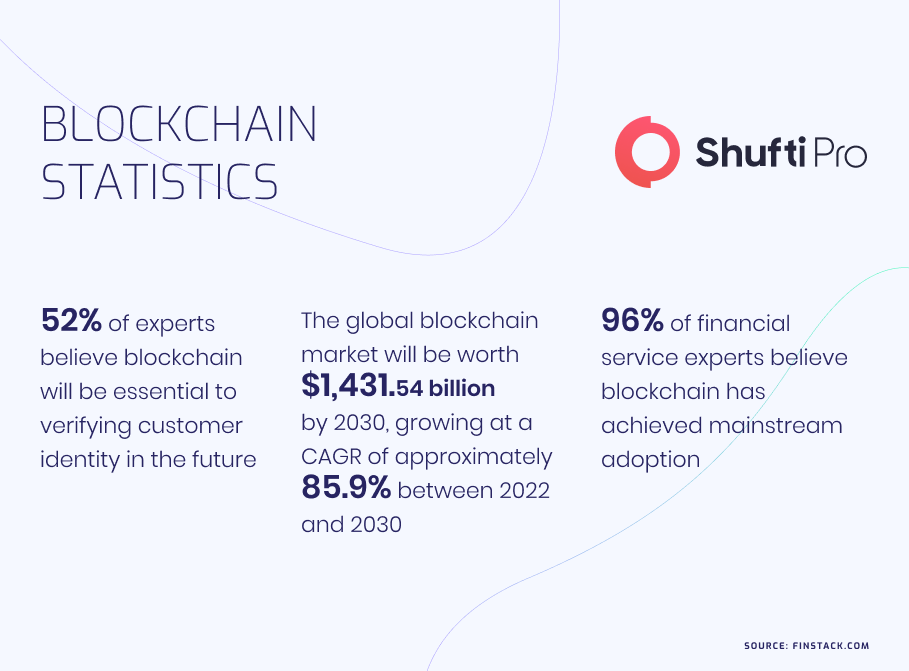Blockchain Technology and KYC for Crypto Exchanges – How Shufti Can Help

KYC compliance is the backbone of the Anti-Money Laundering (AML) measures implemented by any financial institution. The relatively new concept of blockchain-based security measures has seen phenomenal growth across the globe. Considering the advancements in the field of AML systems in financial institutions and cryptocurrency firms, investors consider blockchain as a key to securing their digital assets.
Not only are the investors more convinced with the added privacy, but they also feel secure about storing their digital assets in e-wallets. As cryptocurrencies are not issued by a central banking system, the anonymity offered by the decentralized structure gives criminals the opportunity to launder illicit funds.
Financial Crime Concerns in the Crypto Industry
The decentralized structure of blockchain causes the cryptocurrency sector to face several challenges like the usage of digital assets for illicit purposes. Blockchain’s decentralized ledgers are basically created using an architecture that keeps the digital asset data private and secure. However, the privacy offered by blockchain isn’t all good – as money launderers use this very structure to make cryptocurrency exchanges a safe haven for their illicit funds. Considering the increasing rates of financial crimes in the crypto sector, it is obvious that governments and institutions will need to come up with measures to clamp down on money laundering.
Both the US and the EU have spoken about the urgency for more regulations and oversight of the crypto sector. Not only governments but crypto firms should also do their part to implement robust Know Your Customer (KYC) solutions to mitigate the risk of financial crime. Apart from the major financial hubs, financial regulators throughout the world have also stressed the need for KYC standards that bring crypto firms under the scope of AML compliance just like banks and other financial institutions.
Implementing KYC solutions in crypto firms has proven to be beneficial for crypto firms as they have seen a significant reduction in privacy issues reported by customers. When investors know that they are dealing with digital assets through a secure platform, the concerns of money laundering and terrorist financing are automatically eliminated.
The Role of KYC in AML Compliance
In order to secure their operations and their customers’ accounts, financial institutions throughout the world incorporate technological measures to verify the identities of their customers and perform background screening. The KYC (Know Your Customer) process involves verifying the customers’ identity during onboarding and requires customers’ ID documents along with a selfie to perform verification in real-time.
The KYC process implemented by traditional financial institutions involves various procedures for customer due diligence and ongoing transaction monitoring. This is done to ensure that the requirements of the Paris-based financial watchdog Financial Action Task Force (FATF) are fulfilled. By understanding the potential risk factor of each customer, financial institutions can mitigate the risks of financial crimes like money laundering and terrorist financing.

FATF’s Take on Money Laundering in the Crypto Industry
Just recently, the FATF published a report to call on its member countries to implement the travel rule. This action is being taken to get a better understanding of money laundering and terrorist financing risks within the crypto industry. Many member countries are yet to define the complete laws to cope with the prevailing crypto crimes as defined by the global anti-money laundering watchdog. Businesses will now be required to submit information on cryptocurrency transactions under the rules. Only a small number of the nations examined by the Financial Action Task Force (FATF) claimed to have passed the international standards, and only approximately a third of those countries said they had done so.
FATF added that it would keep an eye on new threats in the industry, such as the usage of cryptocurrencies to get around regulations and launder illegal ransomware attack proceeds. If these rules are successfully implemented, financial service providers will be able to identify their clients and risk score for fraudulent activities and money laundering. In addition, they can also prevent getting their reputation stained due to the sophisticated methods of financial crime used by criminals.
Senior Financial Crime Consultant at Fenergo, Ned Kulakowski stated: “Different countries, jurisdictions and regulators have different views on how crypto should be regulated and what action should be taken if bad actors break the rules. Governments, law enforcement, businesses and financial institutions must continue to share timely information to intercept crime at the source. Only a collaborative approach, leveraging technology and data that inform and can be acted upon, will create a solid foundation for detecting and, crucially, preventing crypto crimes”.
Using KYC and Blockchain Together
Although most crypto traders and investors regard Blockchain’s decentralized structure for its high privacy, they do not realize the disadvantages of the anonymity it provides to money laundering. Legitimate crypto investors are also seen to like the fact that their personal data is always hidden from service providers. However, the absence of KYC compliance allows money launderers to circumvent their proceeds of crime while remaining anonymous. Even though most crypto firms find it difficult to implement robust KYC checks at first, it has proven to reduce the instances of money laundering by a significant margin.
Moreover, identity verification is a basic security measure in any institution that deals with monetary transactions. Legitimate customers do not have any issues with getting their identity verified through real-time KYC verification as they are much more convenient compared to the tiresome manual checks that were implemented previously.
What Shufti Offers
Even after technological advancements in the field of KYC, there are various new conditions to consider before combining them with blockchain technology. In any case, the benefits of both blockchain and KYC complement each other to improve the security of crypto transactions. Protection of customers’ data is essential for crypto firms in order to comply with regulations like the General Data Protection Regulation (GDPR) of the EU.
Proof of ownership and digital signatures in blockchain ensure that crypto users’ data remains unbreachable, which allows SaaS providers to enhance online identity verification solutions and cyber security protocols. Shufti’s state-of-the-art online identity verification services are an ideal solution for every business providing digital services. AI-backed ID verification services enable companies to determine the identities of customers before getting them onboard with 98.67% accuracy in less than a second.
Want to know more about the identity verification solution?











